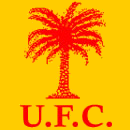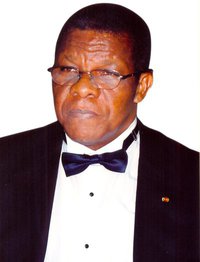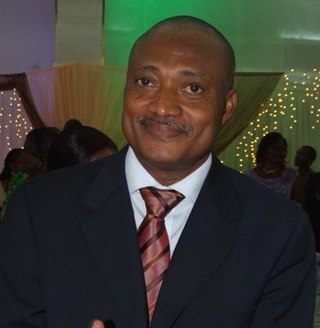The history of Togo can be traced to archaeological finds which indicate that ancient local tribes were able to produce pottery and process tin. During the period from the 11th century to the 16th century, the Ewé, the Mina, the Gun, and various other tribes entered the region. Most of them settled in coastal areas. The Portuguese arrived in the late 15th century, followed by other European powers. Until the 19th century, the coastal region was a major slave trade centre, earning Togo and the surrounding region the name "The Slave Coast".

Elections in Togo take place within the framework of a presidential system. Both the President and the National Assembly are directly elected by voters. Togo is a one party dominant state with the Union for the Republic in power.
Fambaré Ouattara Natchaba was a Togolese politician. He was the President of the National Assembly of Togo from September 2000 to February 2005. He was a prominent member of the ruling Rally of the Togolese People (RPT) and a member of the Pan-African Parliament representing Togo.

Gilchrist Olympio is a Togolese politician who was a long-time opponent of the regime of Gnassingbé Eyadéma and was President of the Union of Forces for Change (UFC), Togo's main opposition party from the 1990s til 2013. Olympio is the son of Sylvanus Olympio, Togo's first President, who was assassinated in a 1963 coup. He is now an ally of the current regime of Faure Gnassingbe, the son of the late President.

The Union of Forces for Change is an opposition political party in Togo. The President of the UFC was Gilchrist Olympio and its Secretary-General was Jean-Pierre Fabre until 10 August 2010. Olympio is the son of the first President of Togo, Sylvanus Olympio, who was assassinated in a 1963 coup. On 10 August 2010, Jean-Pierre Fabre was elected as President of the party.

The Action Committee for Renewal is an opposition political party in Togo. Dodji Apévon has led the party since 2008; previously it was led by Yawovi Agboyibo from 1991 to 2008.

Joseph Kokou Koffigoh is a Togolese politician, human rights activist, and a poet who served as Prime Minister of Togo from 27 August 1991 to 23 April 1994. Elected as prime minister by the opposition-dominated National Conference in 1991, Koffigoh was given full executive powers and tasked with overseeing a transition to multiparty elections. Beginning in December 1991, however, President Gnassingbé Eyadéma increasingly reasserted his authority at Koffigoh's expense. Although Koffigoh remained in office, the opposition eventually abandoned him, feeling he had become too cooperative with Eyadéma.
Yawovi Madji Agboyibo was a Togolese attorney and politician. He served as Prime Minister of Togo from September 2006 to December 2007 and was National President of the Action Committee for Renewal (CAR), an opposition political party, from 1991 to 2008. He was the Honorary President of the CAR.

Parliamentary elections were held in Togo on October 14, 2007 for the 81 seats in the National Assembly. There were over 2,000 candidates, with 32 parties and 41 lists of independent candidates competing. The ruling Rally of the Togolese People (RPT) was victorious, winning a majority of 50 seats. The remaining seats were won by opposition parties; the Union of the Forces of Change (UFC) won 27 seats and the Action Committee for Renewal (CAR) won four seats. They were the first parliamentary elections since the beginning of multiparty politics in the early 1990s in which all major parties participated.

Coordination of New Forces is a political party in Togo led by Joseph Kokou Koffigoh.
March 2000 passed without presidential action. New legislative elections were ultimately rescheduled for October 2001. Because of funding problems and disagreements between the government and opposition, the elections were again delayed, this time until March 2002.
Kopay Electoral District was an electoral district of Sri Lanka between August 1947 and February 1989. The district was named after the town of Kopay in Jaffna District, Northern Province. The 1978 Constitution of Sri Lanka introduced the proportional representation electoral system for electing members of Parliament. The existing 160 mainly single-member electoral districts were replaced with 22 multi-member electoral districts. Kopay electoral district was replaced by the Jaffna multi-member electoral district at the 1989 general elections, the first under the PR system, though Kopay continues to be a polling division of the multi-member electoral district.

Presidential elections were held in Togo on 4 March 2010. Incumbent President Faure Gnassingbé—who won his first term in a presidential election that followed the death of his father, long-time President Gnassingbé Eyadema, in 2005—faced radical opposition candidate Jean-Pierre Fabre, the Secretary-General of the Union of the Forces of Change (UFC), as well as several minor opposition candidates.

Jean-Pierre Fabre is a Togolese politician and the President of Togo's main opposition party, the National Alliance for Change.
This national electoral calendar for the year 2002 lists the national/federal direct elections to be held in 2002 in the de jure and de facto sovereign states. By-elections are excluded, though national referendums are included.

Parliamentary elections were held in Togo on 25 July 2013. The ruling Union for the Republic (UNIR) won 62 of the 91 seats in the National Assembly.
This is a list of events in the 2010s in Angola:

Parliamentary elections were held in Togo on 20 December 2018. They had been initially scheduled for July 2018, but were postponed until ECOWAS called for polling to take place on 20 December. The main opposition parties, which formed Aliance C14, boycotted the elections following the refusal of President Faure Gnassingbé to fully cancel proposed constitution reforms that would allow him to run for two more terms beyond his current ending term in 2020.

Presidential elections were held in Togo on 22 February 2020. Incumbent president Faure Gnassingbé of the Union for the Republic (UPR) was re-elected for his fourth term with 71% of the vote in the first round. His closest challenger was Agbéyomé Kodjo, a former prime minister and leader of the newly established Patriotic Movement for Democracy and Development, who received 19% of the vote.

Parliamentary elections were held in Togo on 29 April 2024 to elect the 113 members of the National Assembly, alongside the first regional elections in the country. The ruling Union for the Republic won 108 of the 113 seats.





